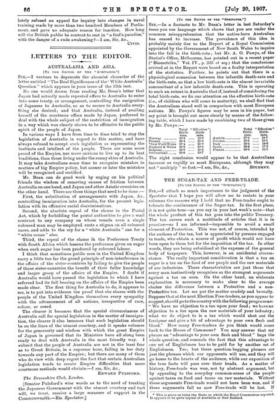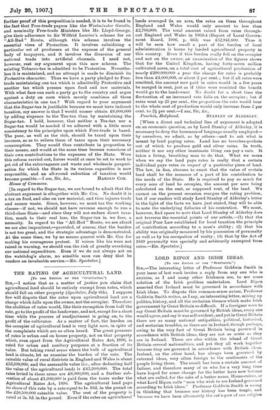THE SUGAR-TAX AND FREE-TRADE.
[TO Tea EDITOR OF Tog "Stemma:too:1
• attach so much importance to the judgment of the
Spectator that I hope you will allow me to restate in your columns the reasons why I bold that no Free-trader ought to tolerate the continuance of the Sugar-tax. In the first place, it is not quite true—as you say in your last week's note—that the whole product of this tax goes into the public Treasury. The tax covers such a multitude of articles that it is in practice—so I am informed—impossible to avoid a small element of Protection. This was not, of course, intended by the authors of the tax, but is appreciated by persons engaged in trade, who obtain a source of profit which would not have been open to them but for the imposition of the tax. In other words, they are being subsidised at the expense of the general body of taxpayers. This, however, is an accidental circum- stance. The really important consideration is that a tax on sugar is a tax on the food of our people and the raw materials of our industries. These characteristics are just those that every man instinctively recognises as the strongest arguments against a tax on corn. On the other hand, an elaborate explanation is necessary to make clear to the average elector the difference between a Protective and a non- Protective tax. Let me put the matter crudely and brutally. Suppose that at the next Election Free-traders, as you appear to suggest, should go to the country with the following programme: "We have no objection to a tax upon your food; we have no objection to a tax upon the raw materials of your industry; what we do object to is a tax which would shut out the foreigner and give a bit of advantage to your own flesh and blood." How many Free-traders do you think would come back to the House of Commons You may answer that my phrase an "advantage to your own flesh and blood" begs the whole question, and conceals the fact that this advantage to one set of Englishmen has to be paid for by another set of Englishmen. Yes; but these question-begging phrases are just the phrases which our opponents will use, and they will go home to the hearts of the audience, while our exposition of the true facts will pass over their heads. As a matter of history, Free-trade was won, not by abstract argument, but by appealing to the everyday common-sense of the people against taxes on food and taxes on raw materials. Without these arguments Free-trade would not have been won, and if these arguments fail us now Free-trade will be lost. If
This is given as being the State on which the Royal Commission reported. It appears to be quite typical of Australia or New Zealand.
further proof of this proposition is needed, it is to be found in the fact that Free-trade papers like the Westminster Gazette, and nominally Free-trade Ministers like Mr. Lloyd-George, give their adherence to Sir Wilfrid Laurier's scheme for an " Route, although this scheme involves the essential vices of Protection. It involves subsidising a particular set of producers at the expense of the general body of taxpayers, and it involves the diversion of our national trade into artificial channels. I need not, however, rest my argument upon this new scheme. The existing Tobacco-tax is admitted to be Protective. Neverthe- less it is maintained, and no attempt is made to diminish its Protective character. Thus we have a party pledged to Free- trade maintaining one tax which is admittedly Protective and another tax which presses upon food and raw materials. With what face can such a party go to the country and argue against a duty on corn which merely combines all three characteristics in one tax ? With regard to your argument that the Sugar-tax is justifiable because we must have indirect taxation, my answer is that I would sooner obtain 26,000,000 by adding sixpence to the Tea-tax than by maintaining the Sugar-tax. I hold, however, that neither a Tea-tax nor a Sugar-tax would be needed if we adhered with a little more consistency to the principles upon which Free-trade is based. The poor, as well as the rich, should be taxed upon their incomes, so as to relieve them of taxes upon their necessary consumption. They would thus contribute in proportion to their means, and would at the same time become conscious of their own contributions to the expenses of the State. Were this reform carried out, forces would at once be set to work to get rid of the extravagance and waste and wholesale pauperi- sation for which the State in its various capacities is now responsible, and an all-round reduction of taxation would become possible.—I am, Sir, &c., HAROLD COX. House of Commons.
[In regard to the Sugar-tax, we are bound to admit that the abstract argument is altogether with Mr. Cox. No doubt it is a tax on food, and also on raw material, and thus injures trade and causes waste. Since, however, we must tax the working classes—if not, we should not have revenue enough to run a third-class State—and since they will not endure direct taxa- tion, much to their real loss, the Sugar-tax is, we fear, a necessity. In regard to the " All-Red " Route, we are afraid we are also impenitent,—provided, of course, that the burden is not too great, and the strategic advantage is demonstrated. At the same time, we by no means quarrel with Mr. Cox for making his courageous protest. If voices like his were not raised in warning, we should run the risk of greatly overdoing our national expenditure. Even if we do not always act on the watchdog's alarm, no sensible man can deny that he renders an invaluable service.—En. Spectator.]







































 Previous page
Previous page